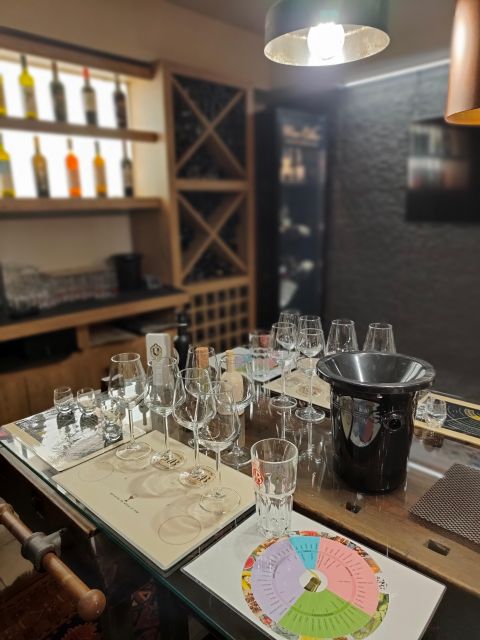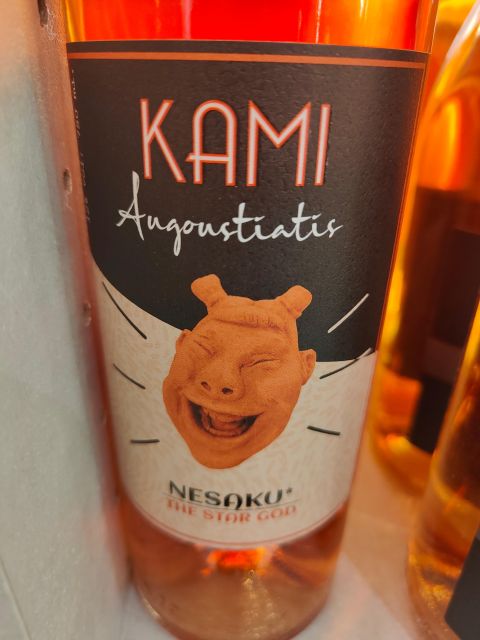Great Rose Wines of Greece
Exploring the realm of Greek rose wines unveils a captivating journey through ancient vineyards and modern winemaking techniques. From the sun-kissed slopes of Crete to the cool island breezes of the Aegean, each sip tells a story of tradition and innovation intertwined. As we explore the nuances of indigenous grape varieties and regional terroirs, a tapestry of flavors unfolds, inviting us to discover the hidden gems that make Greek rose wines stand out on the global stage.
Key Points

- Greek Rosé wines are acclaimed for exceptional quality, unique flavors, and rich winemaking heritage.
- Indigenous grape varieties like Agiorgitiko and Assyrtiko contribute to Greek Rosé’s character.
- Winemaking techniques include organic practices, amphora aging, and a blend of tradition with innovation.
- Notable producers like Domaine Skouras and Gaia Wines craft elegant and complex Rosés.
- Pair Greek Rosé with seafood, grilled vegetables, or Mediterranean salads for a delightful culinary experience.
Here's some more nearby activities we've reviewed
The Rise of Greek Rosé

In recent years, the global wine market has witnessed a notable surge in the popularity and acclaim of Greek Rosé wines, marking a significant shift in the perception of Greece as a producer of high-quality rosé varietals.
Greek Rosé wines have captured the attention of wine enthusiasts worldwide due to their exceptional quality, unique flavors, and the country’s rich winemaking heritage.
The rise of Greek Rosé can be attributed to the increasing focus on indigenous grape varieties, meticulous winemaking techniques, and a growing trend towards lighter, more elegant wine styles.
This newfound recognition has propelled Greek Rosé wines onto the international stage, positioning Greece as a key player in the global rosé wine market and enticing wine lovers with its diverse and delightful offerings.
Greek Rosé Wine Regions

Exploring the diverse wine regions of Greece reveals a tapestry of terroirs that contribute to the unique character and quality of Greek Rosé wines. Each region brings its own distinct flavors and aromas to the wines, creating a delightful variety for wine enthusiasts to explore.
Peloponnese: Known for its rich history and diverse landscapes, this region produces Rosé wines with a perfect balance of acidity and fruitiness.
Aegean Islands: With vineyards overlooking the stunning Aegean Sea, these wines often exhibit a refreshing maritime influence.
Macedonia: Home to some of Greece’s most renowned wineries, Macedonian Rosés are celebrated for their elegance and complexity.
Crete: The warm climate and unique soils of Crete result in Rosé wines with a distinctive Mediterranean character.
Grape Varieties in Greek Rosé

Explore the world of Greek Rosé wines by exploring the diverse grape varieties that contribute to their unique flavors and characteristics.
Greece boasts a rich tapestry of indigenous grape varieties that are used in the production of Rosé wines. One of the most prominent grapes is Agiorgitiko, known for producing Rosés with vibrant acidity and notes of red fruits. Assyrtiko, primarily associated with white wines, also plays a role in creating refreshing and crisp Rosés.
Moschofilero adds floral and citrus aromas to the blend, enhancing the complexity of Greek Rosé. Xinomavro, with its high tannins and acidity, brings structure and depth to Rosé wines. These grape varieties, among others, showcase the diversity and quality of Greek Rosé wines.
Winemaking Techniques in Greece
Greek winemaking techniques showcase a harmonious blend of tradition and innovation, resulting in wines that capture the essence of the country’s rich viticultural heritage.
Greek boasts unique indigenous grape varieties like Xinomavro and Assyrtiko, adding distinct flavors to their wines.
Many Greek winemakers embrace organic and biodynamic practices, respecting the environment and enhancing wine quality.
Some wineries in Greece use traditional clay amphorae for aging wines, imparting a special character and texture to the final product.
While traditional methods are valued, Greek winemakers also incorporate modern techniques to ensure consistency and quality in their wines.
Notable Greek Rosé Producers
Among the notable Greek Rosé producers, some stand out for their dedication to crafting exceptional wines that reflect the unique terroir and grape varieties of Greece.
One such producer is Domaine Skouras, known for its elegant rosés made from indigenous Greek grape varieties like Agiorgitiko.
Another renowned producer is Gaia Wines, which blends Assyrtiko and Agiorgitiko grapes to create a refreshing and complex rosé.
Ktima Kir-Yianni is also highly regarded for its rosé wines, particularly its Xinomavro-based offerings that showcase the rich flavors of this noble grape.
Lastly, Domaine Sigalas from Santorini produces a mineral-driven rosé made from Assyrtiko, offering a taste of the volcanic island’s unique terroir in every sip.
Food Pairing With Greek Rosé

Exploring the diverse culinary possibilities, Greek Rosé wines offer an array of delightful food pairing options that enhance the dining experience. When it comes to enjoying Greek Rosé, consider these fantastic food pairings:
-
Fresh Seafood: The vibrant acidity and fruitiness of Greek Rosé complement the delicate flavors of seafood dishes perfectly.
-
Greek Meze Platter: Enjoy a selection of Mediterranean flavors with olives, feta cheese, hummus, and more, harmonizing beautifully with the versatile nature of Rosé.
-
Grilled Vegetables: The light and refreshing character of Greek Rosé pairs excellently with the smoky sweetness of grilled vegetables.
-
Mediterranean Salads: Whether it’s a classic Greek salad or a fresh Caprese, the crispness of Rosé lends itself well to the vibrant flavors of Mediterranean salads.
Rosé Tasting Tips
Enhance your Rosé tasting experience with these expert tips to fully appreciate the nuances and flavors of this delightful wine.
| Tasting Tip | Description | Example |
|---|---|---|
| 1. Glassware | Choose a glass with a tulip shape to concentrate the aroma. | Use a tulip-shaped glass for optimal aroma concentration. |
| 2. Temperature | Serve Rosé chilled but not too cold, around 45-55°F. | Aim for 50°F for the best balance of flavors. |
| 3. Swirling | Gently swirl the wine in your glass to release aromas. | Swirling helps aerate the wine and enhances the scent. |
Where to Buy Greek Rosé
For those seeking to purchase Greek Rosé wines, a variety of reputable online retailers and specialty wine stores offer a selection of high-quality options to explore.
When looking to buy Greek Rosé, consider the following options:
-
Greek Wine Cellars: Online retailer specializing in Greek wines, offering a curated selection of Rosé wines from different regions.
-
Local Greek Markets: Explore local Greek markets for a chance to discover unique and authentic Rosé wines directly from producers.
-
Specialty Wine Stores: Visit specialty wine stores with a focus on Greek wines to find a diverse range of Rosé options.
-
Online Wine Platforms: Platforms like Vivino or Wine.com feature Greek Rosé wines alongside reviews and ratings for informed purchasing decisions.
Here's a few more nearby tours and experiences we have reviewed.
- Athens Private Full Day Guided Tour (Up to 15 in a Luxurious Mercedes Minibus)
- Private Tour Mycenae Nafplio Nemea Wine & Food Tasting 8 Hour
- Meteora Monasteries & Thermopylae – Private Full Day Tour From Athens
- Cape Sounio
- Delfi Full Day Private Sightseeing Tour
- Greece 5-Day Mountain Adventure With Meteora and Delphi (Apr )
Common questions
What Is the Ideal Serving Temperature for Greek Rosé Wines?
The ideal serving temperature for Greek rosé wines is typically between 46-54°F (8-12°C). This range allows the wine to showcase its vibrant aromas and flavors while maintaining a refreshing and crisp profile on the palate.
Are Greek Rosé Wines Typically Aged in Oak Barrels?
Greek rosé wines are typically not aged in oak barrels. They are often crafted to maintain their fresh and fruity characteristics. This style of aging allows the wine to showcase vibrant flavors and a lively acidity.
How Long Can Greek Rosé Wines Be Stored for Optimal Taste?
Greek rosé wines can be stored for optimal taste for up to 2-3 years, depending on the producer and grape varietals used. Proper storage conditions, such as cool temperatures and limited exposure to light, can help maintain their freshness and flavors.
Are Greek Rosé Wines Suitable for Vegetarians and Vegans?
Greek rosé wines are suitable for vegetarians and vegans. Typically made from grapes, these wines undergo a process that is free from animal-derived products. Always check labels for specific winemaking practices to ensure suitability.
Can Greek Rosé Wines Be Used in Cocktail Recipes?
Greek rosé wines can indeed be used in cocktail recipes to bring a touch of Mediterranean flair. Their vibrant flavors and aromas make them versatile for mixology, adding a unique twist to classic cocktails or inspiring new creations.
Here's more of our most recent tour reviews happening neaby
- Athens: Bike Tour of Athens Historical Centre
- Athens: Kotsanas Ancient Greek Technology Museum Guided Tour
- Explore the Hidden Food Gems of Athens
- Acropolis: Evening Tour With a German-Speaking Guide
- Athens: Cape Sounion Afternoon Tour
- Athens: Peloponnese Highlights Day Trip and V.R. Audio Guide
- Athens: Night Walking City Tour in English or Spanish
- From Central Athens to Athens International Airport
- Athens: Private Mythology Treasure Hunt W Food Stops
- From Athens: Half-Day Ancient Corinth Tour
- Athens: Acropolis Guided Walking Tour & Plaka Audio Tour
Last Words
To sum it up, Greek rosé wines have established themselves as a force to be reckoned with in the global wine market.
With their unique flavors, diverse terroirs, and skilled winemaking techniques, these wines continue to impress both critics and consumers alike.
Whether enjoyed on their own or paired with Mediterranean cuisine, Greek rosés offer a delightful drinking experience that showcases the rich winemaking heritage of Greece.
More Great Things To Do Nearby